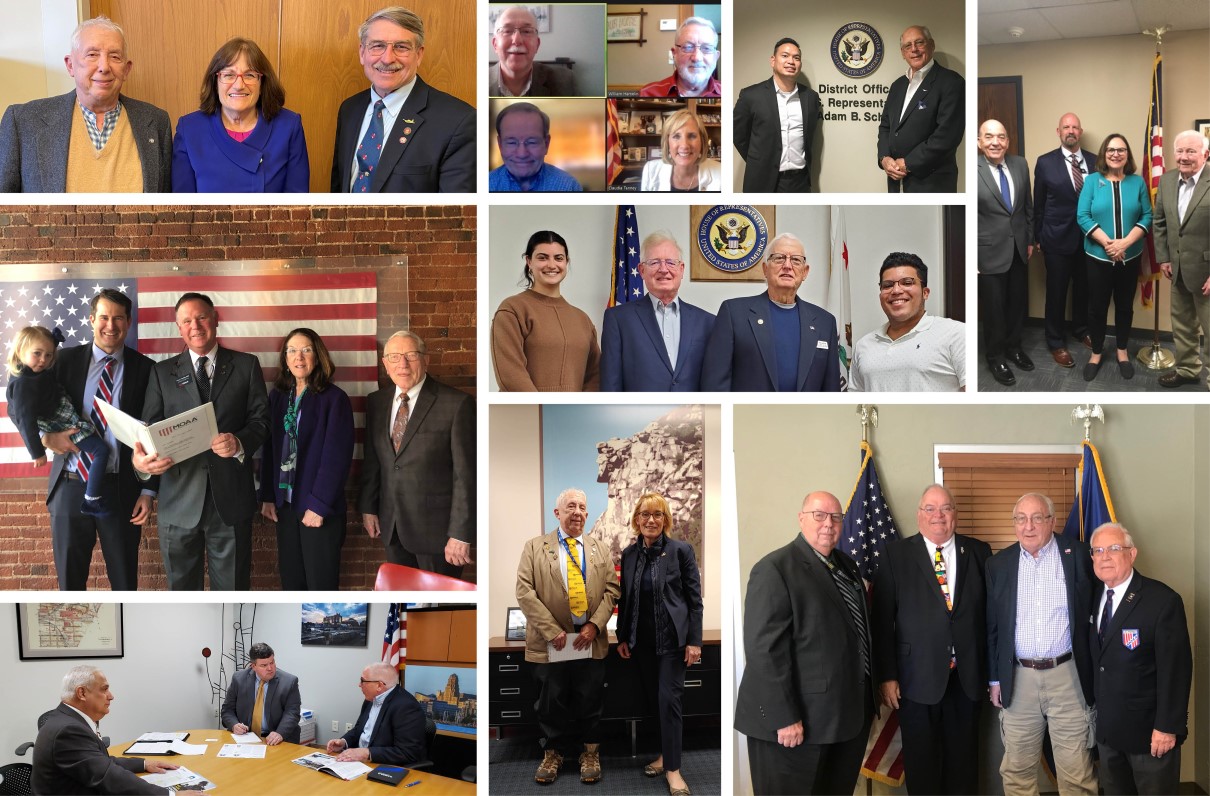 After hundreds of meetings and thousands of letters sent throughout April, MOAA recently concluded its spring advocacy campaign, Advocacy in Action 2022, on a successful note.
After hundreds of meetings and thousands of letters sent throughout April, MOAA recently concluded its spring advocacy campaign, Advocacy in Action 2022, on a successful note.
To adapt to ongoing pandemic restrictions and security measures on Capitol Hill, MOAA conducted a hybrid model for this year’s event. MOAA council and chapter leaders from across the country held meetings with member of Congress and staffers in their home districts throughout April; teams conducted virtual meetings when an in-person meeting was not possible.
Despite not being able to convene on Capitol Hill, the campaign contacted all 535 members of Congress thanks to more than 235 meetings and over 7,500 letters to Congress during the month of April.
Here is an overview of this year’s three topics and what we can expect for each of them this year:
Major Richard Star Act
The Major Richard Star Act (H.R. 1282 | S. 344), which would allow combat-injured veterans to receive both DoD retirement pay and VA disability pay without a dollar-for-dollar offset, had grown to 227 co-sponsors in the House of Representatives and 58 in the Senate as of May 10. Reaching 290 in the House remains the goal.
Your continued advocacy is needed to push this legislation over the tipping point to ensure it is included in this year’s National Defense Authorization Act (NDAA). This path succeeded recently in repealing the Survivor Benefit Plan/Dependency and Indemnity Compensation offset, better known as the “widows tax.”
[TAKE ACTION: Ask Your Lawmakers to Support Concurrent Receipt]
Stop Copay Overpay Act
MOAA’s spring campaign built awareness and support for the Stop Copay Overpay Act (H.R. 4824), a bill that would reduce TRICARE mental health copays. We are still seeking an office to introduce a Senate companion bill and are addressing legitimate concerns about direct spending impacts. MOAA will not support a solution that raises any other TRICARE fees to fund a mental health copay fix.
During Advocacy in Action, MOAA members also helped raise awareness of medical provider strain and burnout following two-plus years of uncertainty and demands associated with COVID-19.
[TAKE ACTION: Help Support Military Family Access to Mental Health Care]
Military Pay Raise
Ensuring a 4.6% pay raise for all unformed servicemembers – a figure in line with federal statute and included in the president’s budget – has seen strong support from members of Congress for this year. While that figure is tied to the Employment Cost Index (ECI), it has fallen significantly behind inflation rates.
Continued advocacy is needed to ask lawmakers to ensure the pay raise keeps up with inflation, and to close the “pay gap” – the 2.6% gap between the raise and the ECI created over three years (FY 2014-16) of shortfalls.
[TAKE ACTION: Urge Your Legislators to Ensure the 4.6% Military Pay Raise as a Minimum]
What’s Next?
Although MOAA members have contacted every Capitol Hill office regarding these advocacy topics, we will continue to engage with Congress to build support for including these important issues in this year’s NDAA. Work on the NDAA and the FY 2023 Budget will pick up in late June, which means MOAA must continue to work with lawmakers from both sides of the aisle on key issues important to servicemembers, their families, retirees, veterans, caregivers, and survivors.
[RELATED: TRICARE Changes, Pay Raise Top MOAA Priorities as NDAA Timeline Takes Shape]
Here are a few ways you can engage with members of Congress to keep MOAA’s priorities on their radar:
- Utilize MOAA’s Legislative Action Center to send pre-written letters to Capitol Hill. You can even customize these letters to share a personal story.
- Use MOAA’s Capitol Switchboard to call your lawmakers. Call toll-free via MOAA’s direct line to the U.S. Capitol Switchboard at (866) 272-6622.
- Engage with congressional offices via social media. This is also a great way to stay informed about what your lawmakers are doing on Capitol Hill.
- Stay up to date with the latest news on our spring advocacy campaign topics, the NDAA, and the FY 2023 budget by subscribing to The MOAA Newsletter. You can check your MOAA newsletter subscription preferences at this link.
With your support, MOAA’s legislative team will continue to fight for these important issues. We will continue to keep the membership updated and ask that you continue to be strong advocates for the community.
More Members Mean More Influence Over Retirement Pay, Health Care, and Family Programs
Get involved and make sure your interests are addressed. Because the larger our voice is, the greater our impact will be.

